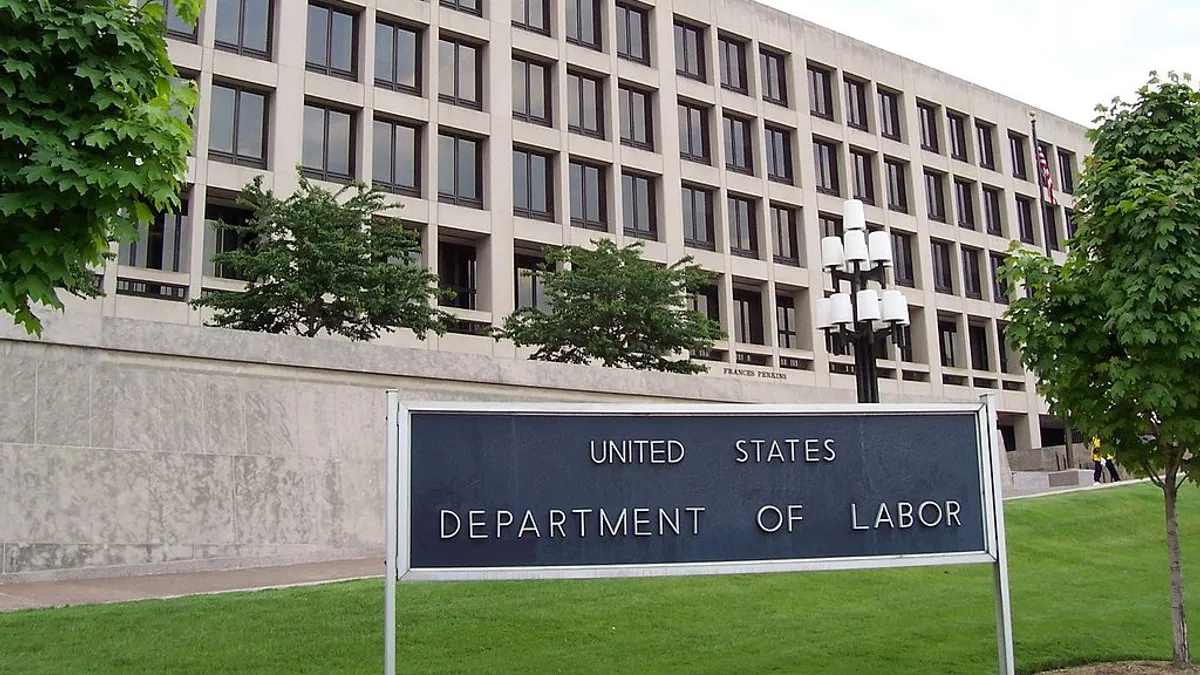UPDATE: Mar. 3, 2021: The U.S. Department of Labor has delayed the independent contractor rule's effective date to May 7, 2021 to allow "agencies to review any questions of fact, law, and policy that the rules may raise."
UPDATE: Feb. 3, 2021: The U.S. Department of Labor has proposed a delay of the independent contractor rule's effective date to May 7, 2021, in accordance with a directive last month by President Joe Biden, according to a filing scheduled to be published in The Federal Register. Under the proposal, stakeholders would have the opportunity to submit public comments on or before Feb. 24.
Dive Brief:
- The U.S. Department of Labor (DOL) published Wednesday a final rule revising its interpretation of the Fair Labor Standards Act's classification provision to determine whether a worker is an employee or independent contractor.
- In a press call Wednesday, a DOL spokesperson said the final rule did not contain any significant changes from the agency's proposed independent contractor rule published in September 2020 — a proposal one management-side attorney called "a jolt of good news" for employers. The rule adopts an "economic reality" test that examines two "core factors": the nature and degree of workers' control over their work and the opportunity for profit or loss based on initiative, investment or both.
- Three additional factors will also be considered under the test — the amount of skill required for the work; the degree of permanence of the working relationship between the potential employer and worker; and whether work is part of an "integrated unit of production" — but these factors "are less probative than the core factors," DOL said. The rule is scheduled for publication in the Federal Register Jan. 7 and will take effect 60 days later.
Dive Insight:
The rule is a highly anticipated regulatory update from the Trump administration, but even DOL officials made clear that questions remain regarding the rule's applicability and longevity heading into the new year.
For starters, the rule applies only to DOL's interpretation of the FLSA's independent contractor classification, the DOL spokesperson said, meaning that certain state and local laws that touch on the issue still apply. One such law is California's Assembly Bill No. 5, or AB-5, which implemented a test analysts said would expand the number of workers that could be classified as employees. In the state's 2020 election, a majority of voters approved an initiative backed by gig-economy companies including Uber and Lyft that would classify workers using these companies' platforms as independent contractors.
Wednesday's final rule is "focused solely on the jurisdiction of DOL," the spokesperson said, and "is not binding" on state governments.
Moreover, the incoming Biden administration could rescind the rule entirely.
Management-side sources saw both the initial proposal and the final rule as a positive development for employers. "The new DOL rule provides a well-reasoned road map, based on well-established precedent, as to how those workplace relationships can be fairly established with certainty," Michael Lotito, shareholder at Littler Mendelson and co-chair of the firm's Workplace Policy Institute, said in an email. "Sound public policy, well recognized precedent and the demands of today's workplace are properly balanced in the DOL rule."
Others criticized the rule for its potential financial impact on workers. According to a tweet from Heidi Schierholz, a former DOL official and director of policy at the think tank Economic Policy Institute, the rule could cost U.S. workers "at least $3.7 billion annually."
In an op-ed published by Fox News on Wednesday, Secretary of Labor Eugene Scalia said the rule would promote entrepreneurship and the ability of workers to have control over their work lives.
"We respect the interest that millions of Americans have in being their own boss," Scalia said. "Of course, companies can't shirk their responsibilities under the FLSA by improperly classifying workers as something they're not — our rule guards against that, too, and the Department will continue to vigorously enforce the law against employers who violate the FLSA, as this administration's record reflects."














